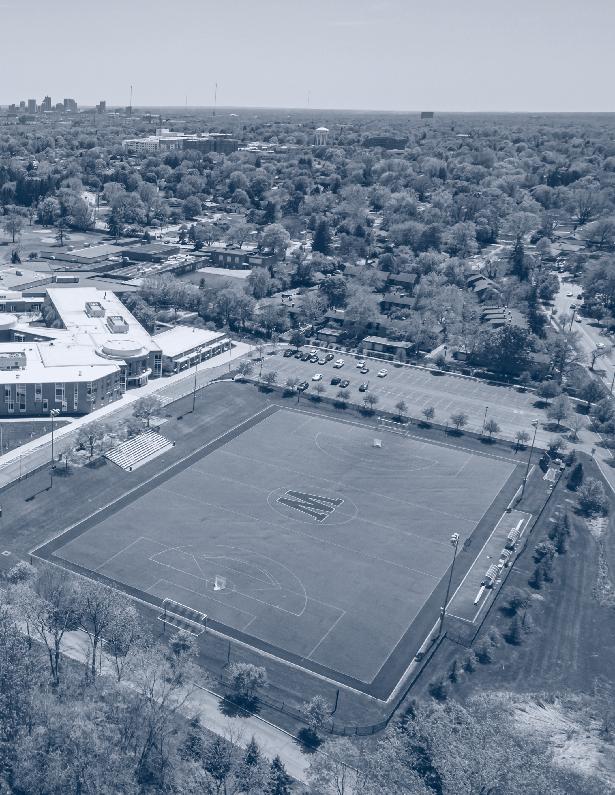Early Childhood & Lower School Programs
Descriptions & Information
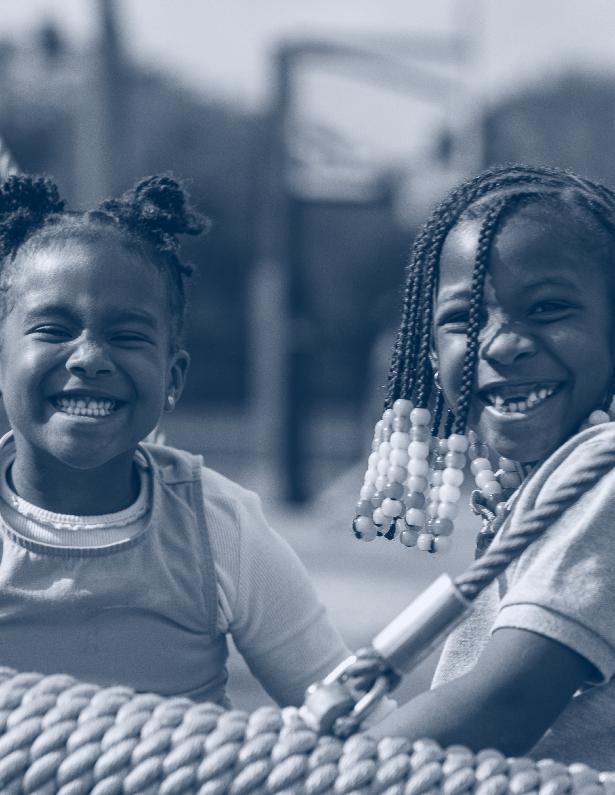




Children’s brains are growing at an extraordinary pace between birth and fourth grade. These years are filled with curiosity, wonder, and an increasing capacity for complex thinking about themselves, their world, and how their actions impact others. At Wellington, our experienced educators embrace this critical window by designing learning experiences that meet children where they are and help them grow into confident, capable learners.
From morning meetings to closing circles, our days are built around connection and care. These intentional routines help create safe spaces where children can take risks, make mistakes, share ideas, and challenge themselves academically, socially, and emotionally.
We believe that every child brings unique strengths, needs, and perspectives to the classroom. That’s why we approach instruction through small, flexible groups of approximately six to eight students, guided by a certified Wellington teacher who is knowledgeable in the best research-based strategies. Using a variety of assessment tools such as observations, student work, benchmark data, and more, we ensure each child is building the foundational skills they need to thrive as readers, writers, mathematicians, thinkers, and citizens.
Walk into our classrooms and you’ll see learning in action. It’s rarely quiet and never passive. You might find students collaborating on writing projects, engaging in respectful debate, experimenting in the science lab, exploring complex ideas through art, or building confidence through early project work. Our spaces are alive with questions, laughter, problem-solving, and discovery.
Sometimes, you might not see our students in the classroom at all. That’s because some of our best learning happens when we step outside our walls. Whether it’s learning about physics through ice skating, understanding ecosystems in a metro park, or applying math in a local grocery store, our students connect what they learn to the real world around them.
Wellington is both a place and a mindset. Our school on Reed Road is where the journey begins, but our learning reaches far beyond its walls. We are preparing students to be engaged citizens of their communities and of the world; they are curious, empathetic, and adaptable.
As a parent of three Wellington students, I love watching my children walk into school ready to learn with joy and purpose. I invite your child to do the same. Join us in a learning journey that is engaging, dynamic, and rooted in knowing each child as a whole learner.
Best, Shelley Brown P '32 '33 '38

Assistant Head of School for Academics and Head of Early Childhood and Lower School
We help students find their purpose and realize their potential for tomorrow’s world.
• Be Curious
• Be Yourself
• Be Ambitious
• Be Empathetic
• Be Responsible

The attributes of our graduates shape curriculum and programming at every age.
We wholeheartedly take ownership of our educational journey, committing to the lifelong pursuit of knowledge fueled by our passion and curiosity.
We approach challenges with positivity and determination, grounded in self-confidence.
We proudly embrace our individuality, celebrating the unique qualities that make us who we are while knowing we are part of a unified whole.
We thoughtfully seek to understand different perspectives, knowing that diversity of all kinds opens our minds and deepens our experiences.
We advocate for ourselves and others, using our voices to drive positive change and empower those around us.
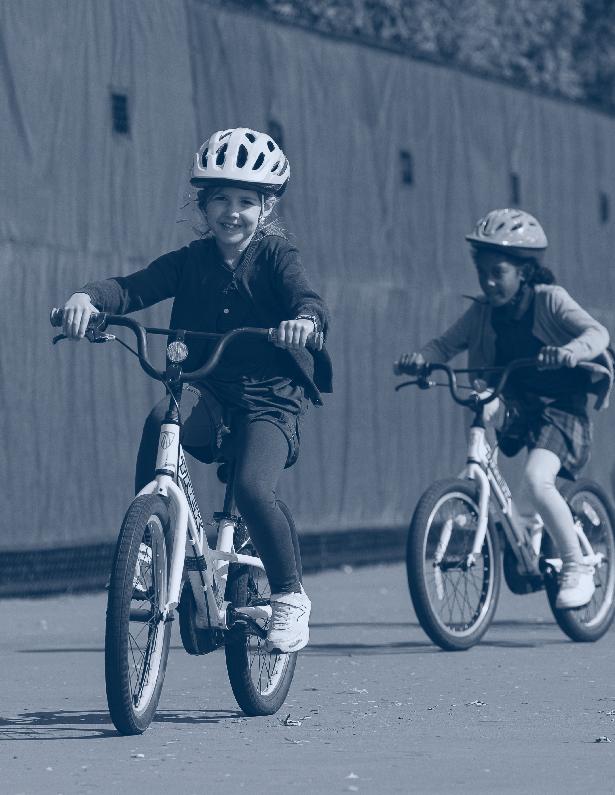
Our early childhood and lower school experience is grounded in the belief that every child deserves instruction that meets their needs, challenges their thinking, and nurtures their growth as a whole learner.
Our approach across all grade levels is rooted in readiness, resulting in a thoughtfully differentiated program where learning is both engaging and developmentally appropriate. Teachers use a range of assessments, from classroom observations to nationally normed benchmarks, to understand each child’s strengths and next steps. These data points inform small, flexible instructional groups of six to eight students, led by certified Wellington educators who use research-based strategies to build strong foundations in reading and math.
All of this happens in classrooms where community and connection matter. Positive relationships, trust, and a sense of belonging create the conditions for students to take risks, persist through challenges, and grow in confidence. Our youngest learners are supported and stretched in ways that honor who they are and prepare them for what’s ahead—academically, socially, and emotionally.
Small classes with an average student-to-teacher ratio of 7:1, ensuring each child is well known.
A dedicated Learning Guide in every grade level who supports student growth alongside classroom teachers.
A balance of small-group and whole-class instruction, allowing teachers to adjust approaches as students progress.
Math and literacy specialists who collaborate with teachers and work directly with students to extend learning or provide additional challenge.
A curriculum grounded in research-based best practices, with fundamentals taught well and with intention.
Year-round health and well-being activities including daily mindful experiences and an extensive gardening initiative.
Early childhood program for three-year-old and prekindergarten students.
Off-campus trips throughout the year including skiing, snowboarding, and gymnastics.
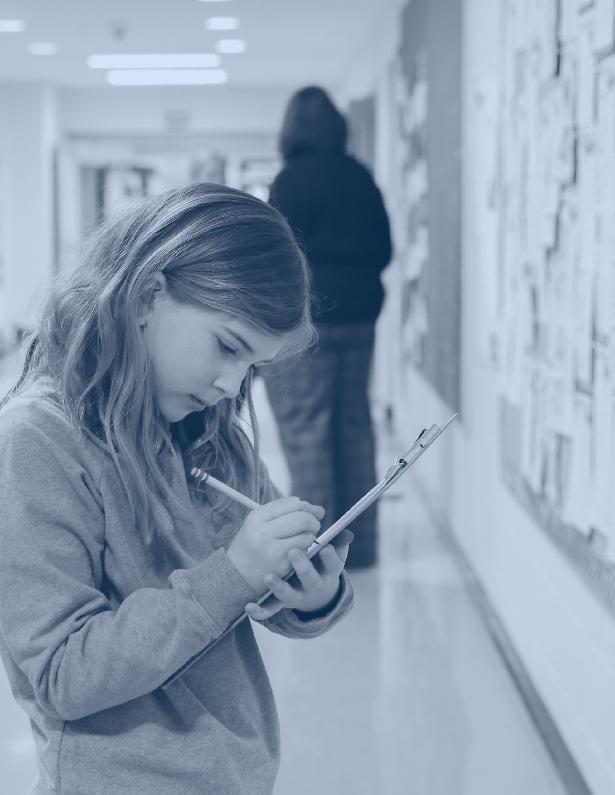
8-9 a.m. Morning Exploration/Project Work: Learning through thoughtfully designed play centers
9-9:30 a.m.
9:25-10:25 a.m.
Morning Meeting: Building community, read aloud, music and movement
Teacher Choice: Small group and 1:1 work with a focus on literacy, math, and fine motor skills
10:30-11:00 a.m. Special Area: music, physical education, French, drama, Explorers
11:00-11:30 a.m. Brain Break
11:40 a.m. - 12:10 p.m. Lunch in Thomas Family Dining Room
12:10-1 p.m. Brain Break
1-2 p.m. Rest
2-2:30 p.m. Quiet Exploration: Quiet choices may include writing, puzzles, and studio work
2:30 - 3 p.m. Afternoon special area class
3-3:25 p.m. Closing Meeting: What went well today
3:25 p.m. Dismissal: Carline or aftercare
8:00-8:15 Opening
8:15-8:35 Morning Meeting
8:35-9:05 Differentiated Math Instruction
9:10-9:40
9:40-10:00 Brain Break/Snack
10:00-10:55 Word Study and Writing
11:00-11:30 French Music PE Music French PE 11:30 - 12:00 Lunch
12:00-12:15 Mindfulness
12:15 - 1:00 Art Science Strings Art Science Strings
1:00-2:00 Differentiated Literacy Instruction
2:00-2:30 Writing
2:35-3:05 Social Studies
3:05-3:25 Closing Meeting 3:25 Bus, Car, Aftercare

Using direct and explicit instruction, students are taught to identify individual letters and letter sounds and combine these letter sounds into reading words. Whether in whole group or small group instruction, students engage in multi-sensory lessons to practice reading and writing. Speaking, listening, phonics, spelling, fluency, comprehension, and handwriting are integral parts of literacy development at every level.
READING: As readers, students read multiple genres representing a variety of authors and perspectives. Students in early grades learn to read in small and supportive groups, and as reading skills strengthen, they use critical reading skills as a foundation for learning across all subject areas.
WRITING: As writers, students receive explicit instruction to craft clear, purposeful pieces across genres. Writing is taught as a powerful tool for self-expression, communication, and connection.
Social studies in the lower school uses an interdisciplinary approach designed to enable students to understand, participate in, and make thoughtful decisions about their world locally and globally. Through conversation, trips off campus, and connections with those beyond or outside of our school, we can enable students to develop a broad and thoughtful view of the similarities and differences inherent in a global society. Social studies explorations at all levels are often integrated with literature, music, art, math, and science. The lower school social studies continuum moves from forming concepts about the world beyond the classroom and local community to consideration of culture, heritage, and democratic principles.
Encouraging students to think deeply about mathematics, developing resilience, and confidently exploring different problem-solving strategies are hallmarks of the lower school program. In math, students engage in small, flexible groups based on pre-unit assessments and ongoing observation. Instruction is targeted to meet each learner’s current level of understanding, providing both stretch and support as they build foundational skills and apply them in meaningful ways.
Early learners develop a deep number sense through hands-on experiences, moving from concrete learning to pictorial, and then abstract learning. This means that students are first introduced to math concepts using manipulatives, and this is true no matter the grade level! Visual models, including bar models, aid in the ability to visualize mathematical situations. Visual models, along with challenging number talks, help students to develop an essential understanding of relationships among numbers while discovering multiple paths to mathematical solutions.
Lower school science is designed to empower and educate future scientists by providing authentic opportunities and experiences. Students develop the skills and knowledge needed to be well-informed citizens, to be prepared for advanced study and careers, and to understand and appreciate the role of science in the real world. The science program utilizes hands-on, research-based best practices to harness the natural curiosity of students.
The highly beneficial inquiry process is emphasized through a hands-on and mindson approach. The lab provides opportunities for students to be actively involved in a variety of scientific investigations that strengthen connections between scientific and engineering practices. Science supports and reinforces the attitude of reflection, respect for logical thinking, and consideration of scientifically-based alternate explanations which align with the Next Generation Science Standards.
The lower school world language program provides students with the opportunity to develop a more expansive worldview through the use of another language and the discovery of multiple perspectives. Language classes are interactive, engaging the whole child through movement, music, sight, and touch. Students participate in small- and large-group activities as they demonstrate comprehension through physical response and use the language to describe, ask questions, and share information about themselves. Classes are conducted almost entirely in French and use themes as vehicles for language use.
The lower school visual arts experience provides opportunities for students to develop creative personal expression. Art education enables each student to develop an aesthetic response to a global, cultural, and artistic heritage. Students develop art skills through the exploration and study of a variety of media while exploring the relationship of art to society. Each child’s unique artistic experience, statement, and potential are celebrated. Our ultimate goal is for each student to develop a foundation for a positive, lifelong relationship with the arts that includes the ability to create, present, respond, and connect ideas with societal, cultural, and historical context to deepen understanding.
The lower school music curriculum addresses all learning styles and is based on an eclectic collection of bestin-class music education philosophies. Musical skills and elements are introduced in a sequential, child-centered progression. Throughout lower school, students have the opportunity to express themselves creatively, collaborate with their peers, communicate with each other and audiences, think critically, and understand music in relation to history and culture.
Throughout the year, instruction focuses on using the voice, each child’s own instrument, as a vehicle to train the ear and enhance musical development.
Lower school physical education promotes confidence and the desire to be physically active for life. Regular physical education provides the opportunity to attain levels of skill development that will allow the students to participate actively in a myriad of activities. Students learn positive attitudes, concepts, and values that will put them on the path to physical literacy. Students develop social skills including independence, responsibility, leadership, cooperation, sportsmanship, and an appreciation of the capabilities of self and others. The physical education program encourages and fosters the development and maintenance of personal physical fitness.
The Wellness Program at Wellington provides essential tools in building character and preparing our students for life beyond Wellington. The role of the school counselor is to remove barriers, promote a growth mindset, and teach positive behaviors to enhance the learning process. Through collaborative learning experiences, students learn to solve problems, persist through setbacks, and achieve personal goals.
Early childhood students take their learning outside during their Explorers class. The Explorers class is where young adventurers dive into the wonders of the natural world! Designed to nurture curiosity and foster a deep connection with the outdoors, this program invites early childhood students to explore the beautiful grounds of Wellington, tend to the gardens, and enjoy the fruits of their labor during harvest season. Early childhood students will get hands-on experience using tools like magnifying glasses, binoculars, and science journals, cultivating their sense of wonder and discovery every step of the way.
Lower school students have access to a plethora of technologies such as Smartboards, iPads, Chromebooks, and 3D printers in our Maker Space to use as tools for authentic learning. They actively participate in hands-on challenges that include, but are not limited to, robotics, coding, and design thinking in order to enhance their ability to solve problems, think critically, persevere, and collaborate. With this interactive curriculum, Wellington prepares students to be innovative risk-takers.
The learning center program at Wellington is designed to empower critical thinking in students as they explore, collaborate, and create. In addition to fostering a community of enthusiastic readers, the curriculum prepares students to be adept researchers, and ethical users of information. Through exploration of literature, inquiry-based research, and media literacy, students are prepared for an information-driven world where they will confidently identify, access, evaluate, and utilize informational resources in all formats.
Limited intervention support is offered to some students who may learn differently or who may need help in building/ strengthening foundational skills across subjects.
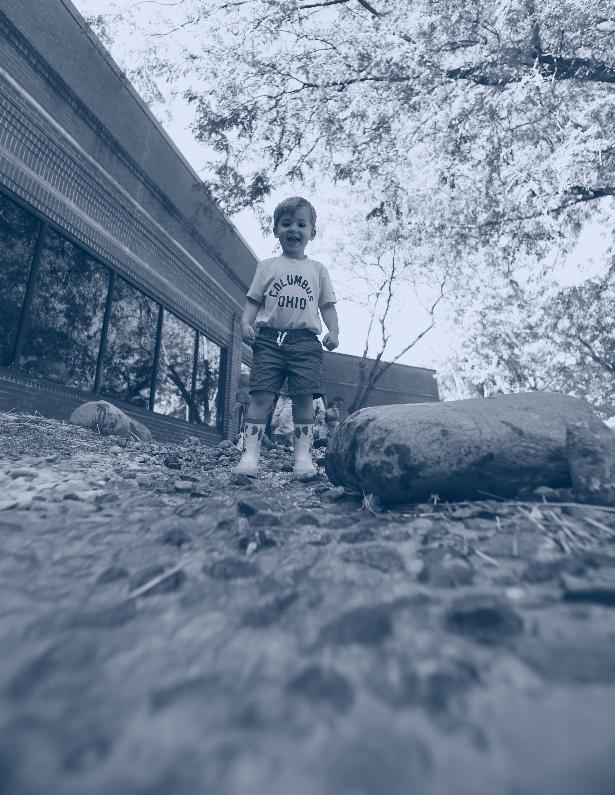
Our Little Jags experience is thoughtfully designed to nurture independence while laying the foundation for joyful, purposeful learning.
Students begin to explore early academic concepts through play, language, and hands-on experiences, all while learning to manage their belongings, navigate social interactions, and build confidence as emerging learners.
Highlights of the Little Jags program include:
• Special Area Classes are integrated into the day with specialists working with students in areas including WIRED (Wellington Innovation, Robotics, Engineering, and Design), Explorers (outdoor learning), wood working, music and drama, PE, and French.
• Field Trips to complement student-driven project work .
• Eat the Rainbow: To brighten up the winter months, our director of outdoor education creates homemade smoothies with Little Jags. This shared cooking experience introduces the Little Jags to fresh fruits and vegetables and allows them to try new foods in a fun and non-pressured environment. We start with red and drink our way through a new color each week!
• Grow Your Mindset Experience: Each grade level participates in an athletic field trip experience that encourages students to try something new in a safe setting with their teachers and peers. Little Jags twirl and roll their way into a growth mindset through gymnastics lessons at a local gym in the spring trimester.
• Spread your Wings and Fly: Observing and caring for caterpillars is a highlight for the Little Jags, but the excitement really takes off when the caterpillars complete their metamorphosis into butterflies before the students’ own eyes.

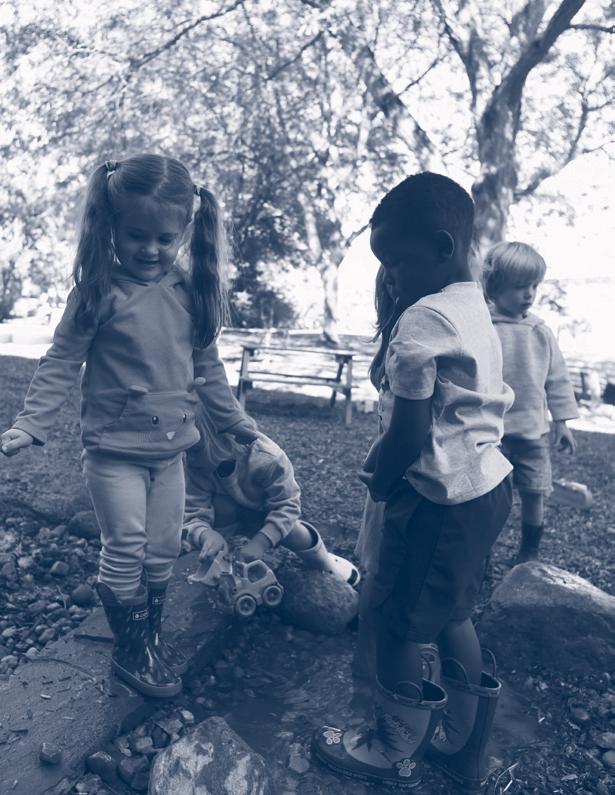

Students learn best through play and high-interest, student-centered projects. In our prekindergarten classrooms, certified educators create a joyful, nurturing environment where learning is purposeful, engaging, and tailored to what each child is ready for. Small group instruction supports the development of foundational literacy and math skills—such as connecting sounds to symbols, exploring numbers and patterns, and building vocabulary through rich language experiences. These academic foundations are strengthened through playful exploration, movement, and hands-on activities that build fine and gross motor skills.
Highlights of the prekindergarten program include:
• Special Area Classes are integrated into the day with specialists working with students in areas including WIRED (Wellington Innovation, Robotics, Engineering, and Design), Explorers (outdoor learning), wood working, music and drama, PE, and French.
• Field Trips to complement student-driven project work.
• Eat the Rainbow: To brighten up the winter months, our director of outdoor education creates homemade smoothies with prekindergarten students. This shared cooking experience introduces the students to fresh fruits and vegetables and allows them to try new foods in a fun and non-pressured environment. We start with red and drink our way through a new color each week!
• ●Grow Your Mindset Experience: Each grade level participates in an athletic field trip experience that encourages students to try something new in a safe setting with their teachers and peers. Prekindergarten students twirl and roll their way into a growth mindset through gymnastics lessons at a local gym in the spring trimester.
• Robotics and Coding: Prekindergarten students gain exposure to coding using Bee-Bots, a codable robot bug. They work together to build courses for the Bee-Bot to travel through and problem-solve together to get the code just right to complete the mazes.
• ●Wellington Playbill: Prekindergarten students take to the stage for the first time in our Blanchard Performing Arts Center. After weeks of practicing songs, spoken lines, and dances, the prekindergarten students perform a spring play for their families and peers. Students perform in a play once a year after prekindergarten, and their individual lines and performances increase in length and difficulty as they move through the grades. The class plays are a way to share a story as a community and to build strong oral language skills and public speaking confidence.

Kindergarten offers increased academic challenge through flexible small-group instruction and hands-on exploration. Certified educators support each child’s growth in reading, writing, and math by tailoring instruction to readiness and interest. Students apply phonics skills to decode texts, express ideas through writing, and use concrete tools to explore math concepts. Passion Projects anchor the experience, allowing students to follow their curiosities, share their expertise, and become joyful, motivated learners who feel like they’re playing—even when they’re working hard.
Highlights of the kindergarten program include:
• Special Area Classes are integrated into the day with specialists working with students in areas including WIRED (Wellington Innovation, Robotics, Engineering, and Design), Explorers (outdoor learning), wood working, music and drama, PE, and French.
• Field trips to complement student-driven project work
• Eat the Rainbow: To brighten up the winter months, our director of outdoor education uses fresh fruit and vegetables to cook creative dishes with kindergarten students. This shared cooking experience introduces the students to fresh fruits and vegetables and allows them to try new foods in a fun and nonpressured environment. We start with red foods and eat our way through the colors of the rainbow!
• ●Grow Your Mindset Experience: Each grade level participates in an athletic field trip experience that encourages students to try something new in a safe setting with their teachers and peers. Kindergarten students twirl and roll their way into a growth mindset through gymnastics lessons at a local gym in the spring trimester.
• ●Passion Projects: What do you consider yourself an expert in, and what would you like to teach your friends? Each fall, our kindergarten students share their passions and take the spotlight as the teacher during their very own Passion Week. We integrate academic learning with each child’s unique interests, enhancing the experience with field trips and guest speakers to bring these passions to life for the entire class.
• Robotics and Coding: Kindergarten students begin the transition from coding Bee-Bots to creating code using Scratch and other coding apps to create interactive stories, games, and animations. Our technology integration specialist supports students’ exploration of coding in the kindergarten classroom.
• Wellington Playbill: Kindergarten students take the stage in our Blanchard Performing Arts Center. After weeks of practicing songs, spoken lines, and dances, the kindergarten students perform a play for their families and peers. Students perform in a play once a year (PK-4), and their individual lines and performances increase in length and difficulty as they move through the grades. The class plays are a way to share a story as a community and to build strong oral language skills and public speaking confidence.
• ●The Ants Go Marching: Kindergarten students learn more about the life cycle of an insect as they observe ants in ant farms. They learn that ants have different jobs and work together to create a successful colony – much like our kindergarten students do in the classroom!

Building on the emerging academic foundations of kindergarten, first grade offers greater structure and deeper opportunities for skill development. Students begin to see themselves as readers, writers, and mathematicians gaining strategies to decode, comprehend, and communicate with growing fluency and confidence. In small, flexible groups, instruction is tailored to meet learners where they are, helping each child stretch, grow, and build stamina. Students also develop a stronger sense of identity within their classroom and school community, recognizing how their actions, words, and ideas can make a meaningful impact.
Highlights of the 1st grade program include:
• Field Trips to complement the study of communities. First grade students explore rural, suburban, and urban areas by visiting different places in the Central Ohio region. Using their first-hand experience of different communities, along with their new learning about maps, first grade students work together in small groups to create Lego communities representing their new knowledge.
• Service Learning: As first grade students begin to understand their impact on their school community and the Columbus community, they partner with LifeCare Alliance for volunteer opportunities throughout the year to make an impact on others outside of our school walls. Helping to create placemats for the Meals on Wheels program, scooping and weighing dog food for the Senior PetCare group, or organizing groceries at the Groceries-to-Go facilities provides hands-on and engaging work for our first grade students to learn how they might give back to their communities.
• Grow Your Mindset Experience: Each grade level participates in an athletic field trip experience that encourages students to try something new in a safe setting with their teachers and peers. First grade students glide their way across the ice during their experience at an ice skating rink during the winter trimester.
• Robotics and Coding: Problem-solving skills for learning to code develop in first grade using beginner iPad apps such as Kodable and Tynker Jr. Through an engaging interface, these apps encourage students to grasp computer science vocabulary and techniques by coding objects to move using directions, sequences, and loops. First grade also begins to explore robots and code robots to complete simple tasks. Perseverance and critical-thinking skills are highlighted as students code procedures to create algorithms using Ozobots. These Ozobots are coded differently than the objects in the apps and move based on a drawn color code. First grade students are given different challenges for the Ozobot to accomplish.
• Wellington Playbill: First grade students take the stage in our Blanchard Performing Arts Center. After weeks of practicing songs, spoken lines, and dances, the first grade students perform a play for their families and peers. Students perform in a play once a year (PK-4), and their individual lines and performances increase in length and difficulty as they move through the grades. The class plays are a way to share a story as a community and to build strong oral language skills and public speaking confidence.
• Skee-ball, Ring Toss, and Milk Bottle Toss: First grade students use the design-thinking process to research, ideate, design, and build carnival games. After they receive feedback from their peers, they improve their games to showcase at the annual first grade carnival.


In second grade, students solidify foundational skills and begin to apply them more independently across subjects. Reading becomes more fluent, writing gains structure and voice, and mathematical thinking moves beyond basic operations to include problem-solving and reasoning. With growing confidence, students take more ownership of their learning, set goals, and reflect on their progress. They continue to work in small, flexible groups with teachers who tailor instruction to individual needs, ensuring that every student is challenged and supported. As students expand their understanding of the world around them, they also develop empathy, collaboration skills, and a stronger sense of belonging within their learning community.
Highlights of the 2nd grade program include:
• Grow Your Mindset Experience: Each grade level participates in an athletic field trip experience that encourages students to try something new in a safe setting with their teachers and peers. Second grade students go skiing/snowboarding during the winter trimester. The winter program builds the essential habits and attitudes of perseverance, self-reliance, problem-solving, and confidence.
• Robotics and Coding: Second grade works on the code.org curriculum throughout the year during STEAM days. They work at their own pace and can track their progress as they go along learning coding skills such as sequencing, looping, debugging, and collecting. In addition to coding, second grade students work in pairs to build and code a Lego WeDo 2.0 robot to complete assigned tasks. Problem-solving, accepting feedback from a peer, and communication are skills that second grade students practice as they complete their projects.
• Shifting From Learning to Read to Reading to Learn: As second grade students transition from learning to read to reading to learn, they deepen their understanding of books as valuable resources for education, research, and enjoyment. Through dynamic book tasting events, students explore a variety of genres and develop the ability to engage deeply with their reading. This approach helps them use books for multiple purposes, enhancing their knowledge and fostering a lifelong love of reading.
• Wellington Playbill: Second grade students take the stage in our Blanchard Performing Arts Center. After weeks of practicing songs, spoken lines, and dances, second grade students perform a play for their families and peers. Students perform in a play once a year (PK-4), and their individual lines and performances increase in length and difficulty as they move through the grades. The class plays are a way to share a story as a community and to build strong oral language skills and public speaking confidence.

In third grade, students begin to make the critical shift from learning foundational skills to applying them with depth and purpose. Reading becomes more analytical as students draw inferences, make connections, and discuss complex ideas. Writing grows in structure, clarity, and voice across multiple genres. In math, students tackle multi-step problems, strengthen number sense, and build confidence in explaining their reasoning. Instruction remains personalized through small, flexible groups, allowing each student to be challenged appropriately. With expanding curiosity, students take on greater responsibility for their learning and explore broader themes of identity, community, and global citizenship through projects that matter to them.
Highlights of the 3rd grade program include:
• Grow Your Mindset Experience: Each grade level participates in an athletic field trip experience that encourages students to try something new in a safe setting with their teachers and peers. Third grade students continue to build on their second grade skiing/snowboarding experience during the winter trimester. The winter program builds the essential habits and attitudes of perseverance, selfreliance, problem-solving, and confidence.
• Robotics and Coding: Third grade continues their code.org curriculum education and build upon their skills by adding another iPad app, Hopscotch. This application allows students to use their sequencing, looping, and debugging skills to create games and drawings by writing codes. Third grade students build Lego EV3 Mindstorm robots in teams of four enhancing their cooperative learning skills and then program the robots in teams of two. In these pairs, they really dig deep for perseverance, critical thinking, and problem-solving to program the robots to move forward, backward, turn, and even retrieve cargo by moving the attached arm.
• Wellington Playbill: Third grade students take the stage in our Blanchard Performing Arts Center. After weeks of practicing songs, spoken lines, and dances, the third grade students perform for their families and peers. Students perform in a play once a year (PK-4), and their individual lines and performances increase in length and difficulty as they move through grades. The class plays are a way to share a story as a community and to build strong oral language skills and public speaking confidence.
• Game On!: Third grade students design board games in teams of three from scratch! They research games, such as the components of a game and what makes a good game, and then they are off following the design process. They each have a job – board designer, piece maker (who uses a CAD program to 3D print the pieces), and rule writer. The final day is game day and families are asked to join in and play along.

Fourth grade represents a culmination of the Lower School experience—where students apply their skills across disciplines with increased independence and ownership. They engage in rich reading and writing experiences that require critical thinking, synthesis, and reflection. In math, they deepen their understanding of multi-digit operations, fractions, and data, often applying their skills in real-world contexts. Collaborative projects challenge them to ask meaningful questions, research thoughtfully, and communicate clearly. With the support of caring teachers and a strong classroom community, students emerge as thoughtful, capable learners ready to navigate more complex academic demands and take an active role in their school and beyond.
Highlights of the 4th grade program include:
• Field Trips continue to highlight student-driven projects, and the culminating fourth grade field trip is a sleep-away camp experience. Students benefit from a culminating overnight science trip to Glen Helen where they work with trained naturalists in a beautiful natural setting.
• Fourth Grade Leaders: Our fourth grade students are the leaders of the lower school. They learn to apply their skills by leading the lower school town meetings. This includes facilitating the event, quieting the group, and introducing guests and speakers. Students begin to head lunch tables and serve food to their younger peers while also taking on the role of buddies for our kindergartners.
• Wellington Playbill: After performing in many grade-level performances, fourth grade students now write and perform their own plays.
• Robotics and Coding: Fourth grade uses Scratch to continue their coding education. They can work on this program from home because it is web-based. Since fourth grade uses Chromebooks, and middle school also uses Scratch, it makes an easy transition. This coding program uses block coding with relevant tutorials that help the students create games, movies, and other inventive interfaces. Fourth grade students use the Lego EV3 Mindstorm in teams of two. In these pairs, they really dig deep for perseverance, critical thinking, and problem-solving to program them to overcome challenges such as moving without wheels or moving through a maze.
• Tree House Design Thinking Project: Fourth grade students create a prototype of a tree house for a culminating art project. This real-world simulation allows students to be both a designer and client. Students will “walk through” design thinking processes and build a tree house keeping their designs grounded in their interests and needs. This project encourages students to think critically, practice using different materials and tools, find solutions to structural issues, and demonstrate resilience in the face of many challenges.
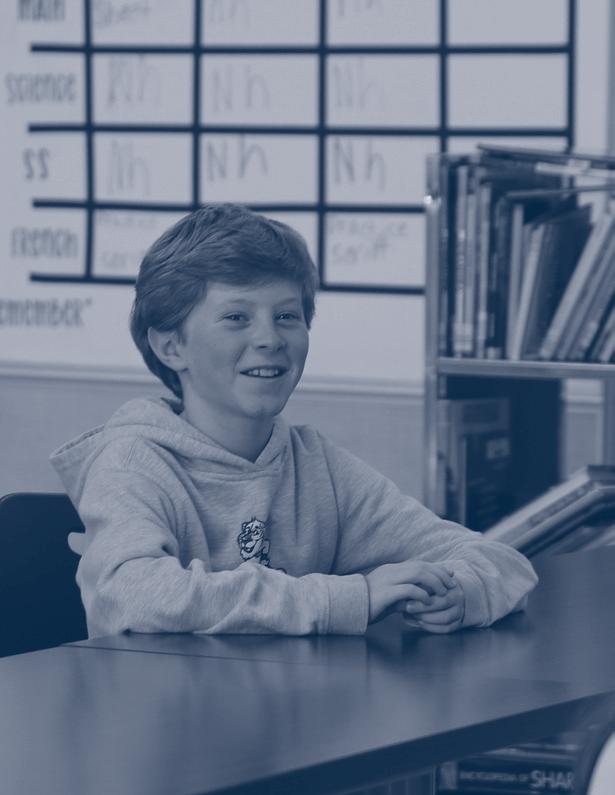
Lower School students leave well-prepared to take on the increasing complexity, independence, and opportunities of Middle School. Across every grade, students continue to build executive function skills, develop strong communication and collaboration strategies, and embrace a growth mindset as a lifelong learning habit. From learning to zip a coat as a Little Jag to leading a song at a Lower School Town Meeting in fourth grade, students become confident leaders and team members, ready to take ownership of their learning. The habits, mindsets, and skills they practice daily position them to enter Middle School with a sense of self, responsibility, and curiosity about what’s next.
As students move through the lower school, they learn key habits and attitudes that prepare them for middle school, including:
Embracing the importance of essential questions in critical thinking
Developing the ability to consider multiple perspectives
Knowing the importance of and strategies for social, emotional, and physical health
Strengthening curiosity and a willingness to take risks and fail
Demonstrating manners, civility, and tolerance, understanding the power of our words
Becoming more culturally competent as world citizens
Learning to independently research and strengthen overall media literacy
Willing to work hard and love it as an engaged learner
Developing a voice and a comfort with public speaking
Developing an awareness that each of us leaves ripples through the community
Each grade level adds a piece to the lower school foundation and positions students to further build upon that base. More than anything, we seek to develop kind, curious, independent, and willing learners as they leave lower school and energetically step to the next level of learning.

